The 1960s at Hobart & William Smith Colleges
By John Marks, Curator of Collections and Exhibits
This topic interested me and, with limited time and word count, I took the easiest route and looked at 1960s yearbooks to see what I could learn. (They are available to the public on the first floor of Hobart & William Smith Colleges’ library but do not leave the library.)
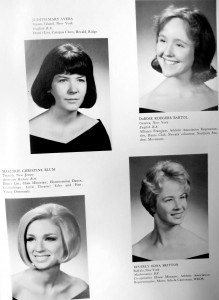
William Smith Seniors, 1965
The first change I noticed was a combination of the two college yearbooks in 1962. The Echo (Hobart) and The Pine (William Smith) were published in one volume but retained their names on the cover. The two groups continued to make their own style decisions as well. In 1968 Hobart seniors posed for formal photos that were displayed in rows. The William Smith graduates each posed wherever they wished and the photos were arranged more artistically on the page. By 1969 both colleges were doing this, and had abandoned captions of hometown, major, activities, and future career.
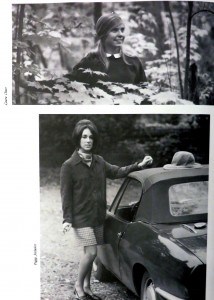
William Smith Seniors, 1968
These changes in personal representation reflected a larger campus movement toward personal freedom. Colleges had parietal rules that controlled visits between opposite genders to each other’s dormitories and especially personal spaces. It varied among colleges, but usually there were curfews, house mothers for women’s dorms, and visits were only allowed in public spaces. Activities might be restricted as well. A friend of mine who attended Oneonta Normal School (now SUNY Oneonta) in the early 1920s was expelled for singing and playing the piano in mixed company after 7 p.m. The students rallied to have her reinstated and their action led to that college’s first student government.
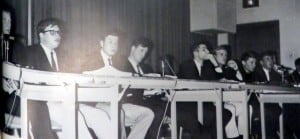
Board of Control, 1966
Hobart had a student Board of Control (BOC) since 1900. The limits of their governance were tested in 1965 when unspecified “new social regulations” were put in place. Based on documents beside the yearbooks, I believe they involved alcohol in dorms and “entertaining” in dorm rooms. While alcohol and sex weren’t invented in the 1960s, college officials everywhere became more concerned with regulating and preventing it.
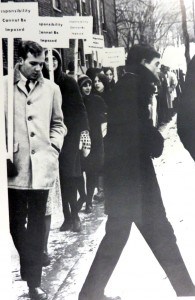
Student protest, 1966
The elected BOC resigned en masse in the winter of 1966. The situation was mentioned briefly in the 1966 yearbook, but earned three pages in the 1967 edition. “History of the Hobart Student Government 1966-67” offered a detailed, albeit biased, account of increased control by the President’s office and student reactions. The 1968 yearbook gave a shorter summary of resolution: the creation of an all-campus (faculty and students) Senate.
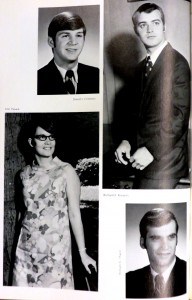
Hobart and William Smith Seniors, 1969
By nature college students aged 18 to 22 years old are pretty inward-focused and self-absorbed. The expansion of personal freedoms seemed to be an issue that unified the campus. While national issues received less space in the yearbooks, larger social change was still evident on campus. Speakers in 1968 and 1969 included Dick Gregory, Julian Bond, Daniel Berrigan, and many more. There were student actions and sit-ins against the Vietnam War, although those photos are mostly uncaptioned. Perhaps the editors felt the larger issues would speak for themselves in the future while the campus government needed more documentation.

This is interesting and informative. I graduated from Colorado University in 1964 and can relate to the situations and concerns you cover here. My great grandparents setting in Geneva and were married there in 1852. They immigrated from Ireland during the famine of 1847-1848. I am hoping one of the many talented young writers who blog here will do something in March on the Irish who settled in Geneva.
While we haven’t yet written specifically about the Irish in Geneva (and that’s a good suggestion that we will file away!), you will find some material about the Irish community in our current blog posts, including those on the farm laborers and domestic servants at Rose Hill: https://historicgeneva.org/general/domestic-service-at-rose-hill/ and https://historicgeneva.org/general/workers-at-rose-hill-farm/.
I graduated from Hobart in ’69 and donated my college memorabilia/papers to the library in ’14. If you ever want to expand on this topic there is plenty of material to use in my collection including the annual editions of the Geneva Times called “Back to College”. BTW I know/knew many of those folks in the pictures. My maternal great grandparents also immigrated from Ireland in the 1840s and settled in Phelps and Clifton Springs. Michael Dalton, my great grandfather served the Union Cause in the 28th NY Infantry Volunteers, Co. E out of Canandaigua.